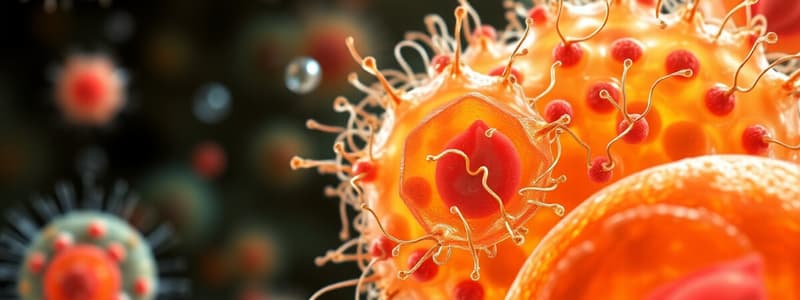Podcast
Questions and Answers
What defines a prokaryotic cell?
What defines a prokaryotic cell?
- It is a unicellular organism without organelles. (correct)
- It has DNA protected within a membrane.
- It can be part of multicellular organisms.
- It contains a nucleus and membrane-bound organelles.
Which of the following is a characteristic of eukaryotic cells?
Which of the following is a characteristic of eukaryotic cells?
- They are always unicellular.
- They contain organelles. (correct)
- They do not have DNA.
- They lack a nucleus.
What role do organelles play in a cell?
What role do organelles play in a cell?
- They carry out specific functions for the cell. (correct)
- They protect the DNA from external damage.
- They are the energy source of the cell.
- They are responsible for cell division only.
Which of the following cells is an example of a prokaryotic cell?
Which of the following cells is an example of a prokaryotic cell?
What defines all eukaryotic cells?
What defines all eukaryotic cells?
Which statement is true about prokaryotic and eukaryotic cells?
Which statement is true about prokaryotic and eukaryotic cells?
Which of the following is NOT a characteristic of prokaryotic cells?
Which of the following is NOT a characteristic of prokaryotic cells?
What is the primary function of a cell membrane?
What is the primary function of a cell membrane?
Which cells are classified as eukaryotic?
Which cells are classified as eukaryotic?
In what way do prokaryotic and eukaryotic cells share similarities?
In what way do prokaryotic and eukaryotic cells share similarities?
Flashcards are hidden until you start studying
Study Notes
Cell Types
- Prokaryotic cells are unicellular organisms that lack internal membrane-bound structures, including a nucleus.
- Eukaryotic cells have a nucleus and organelles, enclosed by a plasma membrane.
- Organelles are like mini-organs for a cell, each carrying out specific jobs.
- Bacteria cells are prokaryotic.
- Plant and animal cells are eukaryotic.
Similarities
- Both prokaryotic and eukaryotic cells have DNA.
- Both have cytoplasm.
- Both are enclosed by a cell membrane.
Differences
- Prokaryotic cells lack a nucleus and membrane-bound organelles.
- Eukaryotic cells have a nucleus and membrane-bound organelles.
- Prokaryotic DNA is not protected within a nucleus. Eukaryotic DNA is protected within a nucleus.
Studying That Suits You
Use AI to generate personalized quizzes and flashcards to suit your learning preferences.




